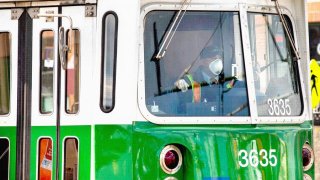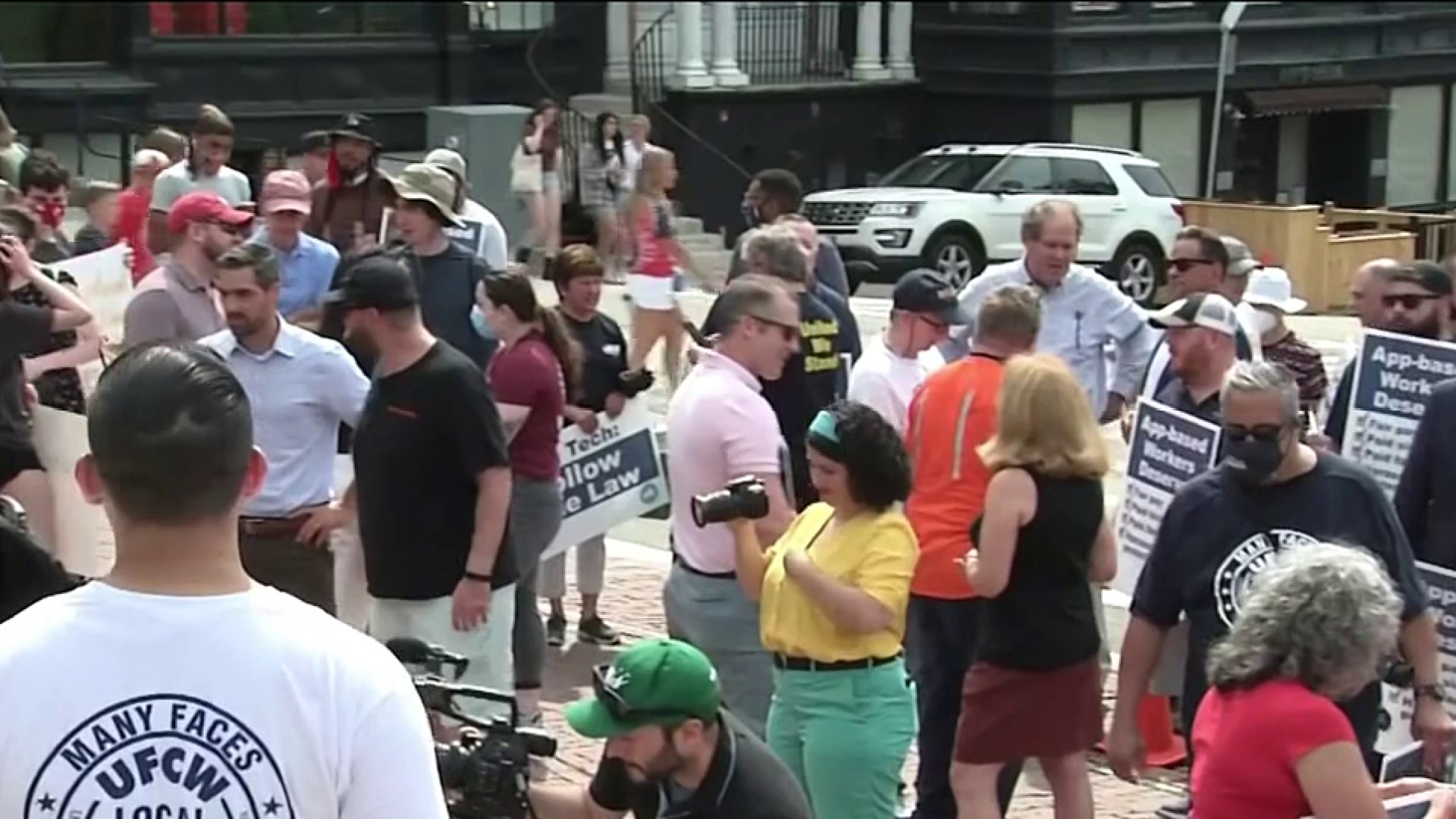
Passenger service on most of the long-awaited Green Line Extension will not begin until five months after the original target amid what officials described as "schedule pressure" inflicted by the COVID-19 pandemic, and two cities that helped foot the project bill are in line to be credited tens of millions of dollars each.
With construction of the $2.3 billion rail expansion about 80 percent complete, MBTA officials on Monday approved a settlement agreement that pushes the expected opening for the six-stop branch running between East Cambridge and Medford from the end of 2021 until May 2022.
Officials remain hopeful that service can begin on the extension's other branch, which will add one stop in Somerville's Union Square, by December 2021. The MBTA for years targeted the end of the year as the start for passenger service. As Boston.com reported in April, the T had quietly pushed the target for the Union Square stop up two months to October, an earlier goal that was reversed with Monday's action.
GLX Project Manager John Dalton told the MBTA's board that, although the project remains in a "very solid financial position," his team faces hurdles as a result of the pandemic.
Get Boston local news, weather forecasts, lifestyle and entertainment stories to your inbox. Sign up for NBC Boston’s newsletters.
"The supply chain impacts we saw and heard about in the summer and fall are now kind of revealing themselves, as far as what materials are arriving on site and installed and then paid for," Dalton said.
"Where this job was five years ago, I think we could say nothing of that nature," Dalton added. "Today, we are reaching a place with significant contingency, which is definitely where we want to be. That said, there is schedule pressure, and there always has been schedule pressure, and that was only exacerbated from COVID-19."
More than 130 "change orders" on the project are still unresolved, Dalton said, which according to a T spokesperson include issues such as crews encountering buried obstructions and design changes forced by updates in building codes.
Dalton also warned that "any project of this nature has potential risk for litigation exposure."
Asked for clarification on potential litigation, MBTA spokesperson Lisa Battiston said in a statement that there is no pending lawsuit filed against GLX.
"However, the contractor has formally notified the MBTA of being impacted for both time and money due to COVID 19," Battiston said in a statement. "Impacts stem predominantly from site-work productivity impacts and impacts experienced by off-site fabrication facilities/factories. The project could absorb many of those impacts without affecting the revenue service dates (or 'critical path'), but there were some critical materials that the project's schedule could not absorb."
The settlement agreement, which the Fiscal and Management Control Board approved with no dissent on Monday, allows a delayed start of passenger service, while resolving the change orders and risks of litigation, Dalton said.
It would max out at an additional price tag of $80 million, though Dalton stressed that contractors "must go earn this" by achieving the new targets.
"As much as we may feel like COVID-19 is in the rearview mirror, from a project perspective, we're not there yet," he said. "This settlement agreement I'm presenting today closes the book on COVID-19 with respect to GLX."
Construction on the 4.7-mile extension began in 2018, and since then officials have circled the end of 2021 as the target for trains to begin shuttling passengers beyond the Green Line's current terminus of Lechmere into Cambridge, Somerville and Medford.
Officials also announced Monday that Cambridge and Somerville will no longer need to pay the money they committed several years ago -- $50 million from Somerville, $25 million from Cambridge -- to help float the project.
The two cities have paid an unspecified portion already, but because construction has remained on budget and because of a boost the T got from the American Rescue Plan Act, MBTA General Manager Steve Poftak said Cambridge and Somerville will not need to write any more checks. He also said both municipalities are in line to get back any money they already paid toward the rail expansion that will wind through the cities.
"I want to state my high degree of confidence that, barring any major unforeseen event, the funds already disbursed to GLX by Somerville and Cambridge will be returned to these communities following project close-out," Poftak said. "Each of these communities took a significant risk at a moment of great uncertainty when this project was in grave peril."
Somerville Mayor Joe Curtatone told the FMCB on Monday that he and Cambridge leaders "did something unprecedented" by pledging a combined $75 million in municipal dollars.
"More than 30,000 net new jobs, more than 10,000 units of housing in a region that's still in a housing emergency, more than $3 billion in net new economic activity," Curtatone said, rattling off projected benefits from the expansion. "It's not only happening, it's exceeding expectations, and we all benefit, the whole commonwealth."
The delay in passenger service is a setback for a project that has been discussed for more than a decade and at one point appeared doomed amid cost estimates that ballooned up to $3 billion, about $700 million more than the current price tag.
It's also another blemish on a major MBTA priority linked partly to the pandemic. Officials announced in October that the T will not finish replacing train fleets with all-new cars until April 2023 for the Orange Line, 15 months behind the original schedule, and September 2024 for the Red Line, a delay of a year.
The first batches of those train cars, manufactured by Chinese firm CRRC, also remain out of service more than three months after one derailed on the Orange Line. Investigators found that side bearer pads on the vehicles are wearing down more quickly than expected, which was one factor in the incident, alongside issues with the track.
"We are continuing to work, not only internally but with a number of external partners, to work on a plan to get those cars back in service, engaging with our outside regulators as well, with a goal of getting those cars back in service this summer," Poftak said at Monday's meeting. "We hope to be able to share with the public a more detailed timetable once we're able to put that plan fully together."



